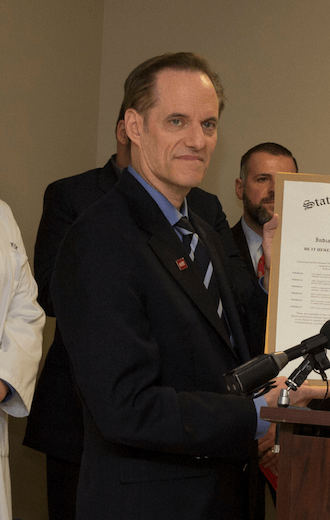Comments made by a federal judge at a June 10 hearing suggest that a False Claims Act lawsuit brought by three former employees of the AIDS Healthcare Foundation (AHF) against the AIDS agency is struggling.
“I don't know of any case that allows a qui tam action to be brought based on the idea of ‘generally speaking this is how we did business,’” said Judge Kathleen M. Williams, who presides over a Florida US district court. “Qui tam, the sine qua non, is a claim; Jack submitted claim 12 for this, or AIDS Healthcare Foundation submitted claim 8 for this, or Bob who worked for AIDS Healthcare Foundation and got a kickback of 75 bucks on May 2nd. The broad strokes of aggregate data only resonates in the context of whether there is a claim that an entity received a government boon, a rebate, some type of government discount because they submitted bogus numbers to the government.”
Qui tam lawsuits are brought by whistleblowers under the federal False Claims Act. The three former AHF employees, Shawn Loftis, Mauricio Ferrer, and Jack Carrel, also cite a similar Florida statute. The three charge that AHF defrauded the federal government and Florida by paying incentives and bonuses to employees for increasing HIV testing, identifying more HIV-positive people, and steering those people to AHF facilities for treatment and care. The lawsuit also charges that some patients were given incentives to use AHF facilities.
Charges HIV agency made “false claims” based on incentives paid employees, patients may not survive dismissal motion
AHF has countered that the bonuses and incentives are employee compensation that is allowed under safe harbor provisions under federal law. Federal law allows very limited provider-paid incentives for Medicare and Medicaid patients.
The federal government and Florida reimbursed AHF for the testing and later care and treatment through Medicare, a federal health program, Medicaid, a health program that is jointly funded by the states and the federal government, and other federal agencies. AHF is headquartered in Los Angeles and operates in 12 states.
Later in the hearing, Ted Leopold, who is lead counsel for the former employees in the suit and a partner at Cohen Milstein Sellers & Toll PLLC, told Williams that he believed they had supplied specific claims.
“And we go through some other names and set forth the timeframes, the linkage, subject matter, the job descriptions, the payments, the payroll accounts, and we set all that forward in here as specific examples,” Leopold said referring to earlier court filings. “And there are 900 and some odd examples of this that we have attached to the complaint… But this gives all of the information of who, what, when, where, and there are more documents that can support that.”
Williams was unconvinced.
“No, I don't think so most respectfully to you, Mr. Leopold,” she said, according to the hearing transcript, which was released on July 1. “These are spread sheets. You need to tell me in no uncertain terms, Jason Handy received a thousand dollars on this date for kickbacks for patient referrals; his patients were Bob and Tom. This is a violation of Medicare protocol, law, and therefore we have a case of qui tam. You cannot just append the spread sheets of a business and say this looks really bad and we think it is a bad way to run your business.”
Such lawsuits are first filed under seal and the government is required to investigate the allegations. It then decides if it will join the case. The plaintiffs in these lawsuits, the three former employees in this case, collect a percentage of the settlement or judgment. If they win, a judgment in the AHF case could run to tens of millions of dollars.
The suit was filed in June of last year and in February of this year, Florida and the federal government declined to intervene. While the federal statute says that no inferences can be drawn from a decision to not intervene, data strongly suggest that when the federal government does not intervene, the case will not be successful.
AHF has since sued the three former employees and their attorneys demanding the return of patient records. AHF had employees save patient records on agency-owned hard drives to avoid losing data to computer crashes. When Carrel was discharged, he returned his AHF laptop, but the hard drive was in his home and he was never asked to return that, according to an email exchange between Leopold and AHF’s attorney, Mitchell A. Kamin, a principal at Bird, Marella, Boxer, Wolpert, Nessim, Drooks, Lincenberg & Rhow, P.C. The email exchange was filed in court records. Carrel’s hard drive provided “most of the documents,” Leopold wrote.
AHF alleges that when the qui tam lawsuit was filed publicly, the filing contained records that identified individual patients. Both sides are negotiating a protective order that will prevent any further release of what may be patient information.
Both sides have filed motions to dismiss in both cases. Williams denied Leopold’s request for expedited discovery in the case against AHF, which suggests that even with the documents Carrel provided, the plaintiffs in that case do not yet have records demonstrating specific fraudulent activity.
“Qui tam reverses the usual litigation perspective,” Williams said. “So you don’t start with the macro, the big picture… We start with the micro, Jack got this money on this date and/ or Jack submitted this claim, Medicare paid and it was false. So, the overall discussion of the conduct of an entity like AIDS Health might put it in context, but without the individual allegation of fraud and misconduct with who, what when, where and why, that story can't proceed.”
Williams set various dates in July and August for the parties in both cases to respond to the motions to dismiss or to file an amended complaint. The judge set no date for her rulings on these issues.


































